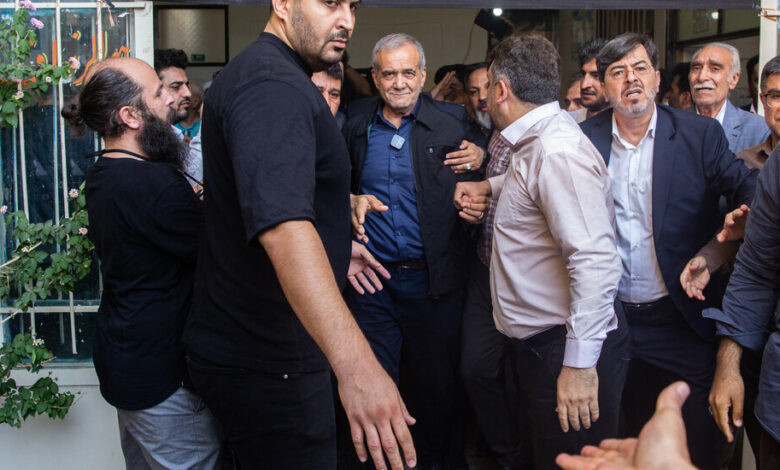Hopes for diplomatic opening grow under new Iranian president

With the election of reformist candidate Masoud Pezeshkian as president, Iran could see a softening of its absolutist foreign policy and even a chance for a new diplomatic opening, current and former officials and experts say.
Mr. Pezeshkian, a cardiologist, member of parliament and former health minister, has little direct experience in foreign policy. But he has promised to empower Iran’s most elite and globalist diplomats to run his foreign agenda, raising hopes for a warmer relationship with the West.
Mr. Pezeshkian “represents a more pragmatic and less confrontational attitude toward the outside world and the inside,” said Dennis B. Ross, who served as a special assistant to President Barack Obama and is a longtime Middle East negotiator.
Still, Ross noted that Iran’s Supreme Leader, Ayatollah Ali Khamenei, “would do a lot to limit Pezeshkian’s international agenda.”
Most of the Iranian president’s powers are limited to domestic issues. It is Mr. Khamenei, as the country’s highest political and religious official, who makes all major policy decisions, especially on foreign affairs and Iran’s nuclear program.
The other leading force in the Iranian system, the Islamic Revolutionary Guard Corps, oversees all of Iran’s military affairs. The Revolutionary Guard and the Supreme Leader are closely linked, and they decide when and how to use military power, whether it’s by unleashing their vassals in Iraq, Syria, Lebanon, and Yemen, or by threatening Israel.
Iran’s foreign policy has become increasingly hardline in recent years, diplomats and analysts say, and that trend could continue under Mr. Pezeshkian. That includes strengthening alliances with other authoritarian states — as Iran has done by arming Russia with drones and missiles to strike Ukraine — and portraying itself as a force to be reckoned with in both the Middle East and the West, despite its domestic turmoil and collapsing economy.
The Iranian axis of resistance has been so remarkably successful that it is difficult to understand why anyone would want to disrupt a policy that has allowed Tehran to exercise power with some degree of impunity,” said Ray Takeyh, an Iran expert at the Council on Foreign Relations, wrote in an analysis as the elections approached.
Involvement in the world
Analysts say the president can have the greatest impact internationally by shaping how Iran’s policies are viewed around the world, largely through the diplomats he selects. In this regard, the contrast between Mr. Pezeshkian and his main challenger, the anti-Western ultraconservative Saeed Jalili, is bald.
During the hardline presidency of Mahmoud Ahmadinejad, Mr. Jalili had outright opposed a deal with world powers to curb Iran’s nuclear program in exchange for relief from harsh economic sanctions. Instead, he had pushed for enriching uranium to weapons-grade levels, Experts from the Stimson Center wrote in an analysis in June.
“His approach has led to the isolation of Iran,” said Ali Vaez, the Iran director for the International Crisis Group. “He does not believe in the value of dealing with the West.”
Under Mr Pezeshkian’s leadership, he said: “I think the chances of a diplomatic breakthrough will increase.”
Easing of relations with the West
Mr. Pezeshkian has said he is committed to a policy of international engagement and supports an easing of relations with the West with the aim of ending sanctions. He says he wants to foster communication with most other governments around the world — except Israel — but he has also warned against placing too much value on alliances with Russia and China. That is “because then they could exploit Iran” and further isolate it globally, Mr. Vaez said.
“If we want to work on the basis of this policy, we need to behave well towards everyone and build a good relationship with everyone based on dignity and interests,” Mr. Pezeshkian said in May. “The more we improve our foreign relations, the closer we come to the above-mentioned policy, but the more tensions increase, the more we deviate from it and the situation deteriorates.”
Mr. Vaez said that Mr. Pezeshkian has not made specific foreign policy proposals and has been open about his lack of international experience. But his campaign’s top foreign policy adviser was Mohammad Javad Zarif, the former foreign minister who brokered a nuclear deal with world powers in 2015. Mr. Zarif, an astute English-speaking diplomat who has lived in the United States, has been derided at home by hardliners as a fictional American.
The Trump Factor
A key test of Iran’s interest in diplomacy with the West will be whether it responds to efforts to revive the 2015 nuclear deal. The issue is further complicated by the candidacy of former President Donald J. Trump.
The agreement, which aimed to prevent Iran from building a nuclear bomb, technically expires next yearBut it has been all but dead since Mr. Trump withdrew the United States from the deal in 2018 and reimposed U.S. sanctions, prompting Iran to accelerate its uranium enrichment to the point where experts say it is now capable of producing the fuel for three or more bombs in days or weeks.
Iran has long maintained that its nuclear program is peaceful and that it is prohibited from producing or using nuclear weapons under a 2003 “fatwa,” or religious edict, issued by Mr. Khamenei. U.S. officials say there is no evidence of any current effort to weaponize Iran’s near-bomb-grade uranium, but the Israelis claim that such efforts are indeed underway under the guise of university research.
Catherine Ashton, a British diplomat who oversaw the nuclear talks as the European Union’s foreign policy chief when an interim deal was reached in 2013, worked closely with both Mr. Jalili and Mr. Zarif at the negotiating table. She said Mr. Jalili seemed most concerned about “letting the negotiations continue when there has been no real progress or outcome.”
Mr Zarif, by contrast, had “a much better understanding of the US and Europe, and a determination to secure Iran’s future in the region,” Ms Ashton said.
Mr. Khamenei had warned Iranians against electing a president who could be seen as too open to the West, particularly the United States. Diplomats also note that the warming of transactional ties with Russia over the past decade, after years of mistrust and discord, has helped Iran cope with continued international isolation.
The war in Gaza has exacerbated tensions between the United States and Iran-backed forces in Lebanon, Syria, Iraq and Yemen, reducing the possibility of new agreements between Washington and Tehran. Experts from the Stimson Center wrote.
After an Israeli attack on the Iranian embassy compound in Syria in April, which killed several Iranian commanders, Tehran retaliated by firing hundreds of missiles and drones into Israel, most of which were intercepted. It marked a serious escalation between the two foes and most likely led to Iran ensuring that it deployed a more powerful deterrent.
Avoiding conflict with the US
Yet the Iranians are aware that the United States is determined to prevent an extension of the conflict in the Middle East, and there have been secret messages between the two capitals emphasizing the dangers.
A prisoner swap between the two countries last year had raised hopes for further diplomatic cooperation, as had indirect talks on the nuclear program. But Iran is now focused on how — or whether — to deal with Trump if he is re-elected in November, as is widely expected by the Iranian political class.
Mr Ross, the negotiator, said the new Iranian president will have some room to maneuver in adjusting the balance between “pragmatism or adhering to the ideological standards set by the supreme leader” in making government decisions.
But that will not go so far in Mr. Pezeshkian’s foreign policy dealings, particularly with the United States, where Mr. Khamenei has set clear boundaries. Even when it came to the 2015 nuclear deal, Mr. Ross said, the supreme leader “distanced himself from the deal and positioned himself to say ‘I told you so’ when Trump walked away from it.”




